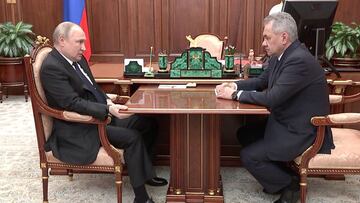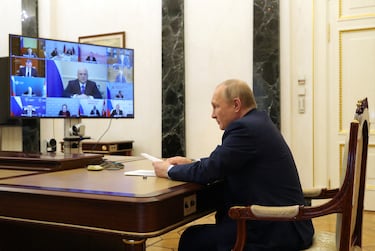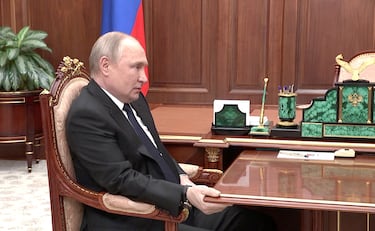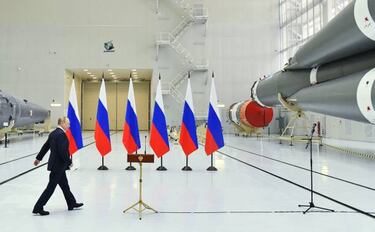Vladimir Putin’s strange gesture during ministerial meeting deciphered
In a talk with his defence minister, Sergey Shoigu, the Russian president is shown holding the table with a meaning being derived from the posture.


On 24 February Russia’s President Vladimir Putin announced a ‘special military operation’ in Ukraine. Almost two months have passed since then, and the Russian president’s appearances have been very limited, often only to make threats towards the countries around the world supporting the defence of Ukraine or to further his propaganda campaign for his own population, starved of balanced media coverage.
His popularity, maybe unsurprisingly given the last statement, has risen, with an approval rating said to be close to 83 percent.

What do Putin’s table gestures mean?
In these few public appearances, however, every gesture by Putin, every little detail in front of the cameras has been scrutinised, with experts looking for clues as to what he may be planning, and what his state of mind is. The latest of these, while meeting with his defence minister, Sergey Shoigu, has had several analysts concerned about a gesture, one where he is holding an end of the table that is separating the two men with his right hand and adopting a strange posture.
Patrycia Centeno, an expert in non-verbal communication, highlights the situation and gives possible causes.
“Either he is holding the table so that it doesn’t fall over, or he doesn’t like what his defence minister is telling him, or he has intestinal problems,” she opines, not exactly nailing her colours to the mast.

José Luis Martín Ovejero, a professor of non-verbal communication and public speaking, agrees.
“It could be due to a health problem. It could also be an involuntary gesture of restraint in the face showing something has made him uncomfortable. It is strange for Putin, even more so given his contracted body position.”
Is Putin’s right arm gesture linked to KGB?
Another physical trait of the Russian leader has been much talked about: his manner of walking. When he does, people have noted that he leaves his right arm totally rigid, a characteristic that has been analysed by the British Medical Journal. According to the study, based on examination of different videos of high-ranking Russian officials, it is said that it could have its origins during his presence in the Soviet espionage agency, the KGB.

Related stories
“It may be the result of a behavioural adaptation, possibly triggered by the KGB or other forms of weapons training in which trainees are taught to keep their right hand close to their chest while walking, allowing them to quickly draw a weapon when confronted by an enemy,” says the study published back in 2015.
This behaviour was also found in other senior officials and confidants of Putin, including Dmitry Medvedev (current deputy chairman of the Security Council), Anatoly Serdyukov, Sergei Ivanov and Anatoly Sidorov.

